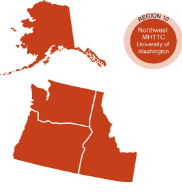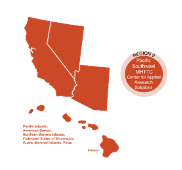Home > The ISF West Coast Party Webinars: Enhancing MTSS - Integrating Student Mental Health and Wellness through Systems, Data, and Practices

The Northwest MHTTC and the Pacific Southwest MHTTC are continuing our partnership to provide and extend deeper technical assistance on the Interconnected Systems Framework (ISF).
Interconnected Systems Framework (ISF) is a structure and process that maximizes effectiveness and efficiency by blending the strengths of school and community mental health with strengths of the multi-tiered framework of PBIS (Barrett, Eber, Weist, 2013).
We offered three webinars on the Interconnected Systems Framework (see below for recordings) and followed the learning series up with monthly discussion hours led by Susan Barrett and field leaders from our region.
From October 2020 - February 2021, we offered programming to deepen your ISF work and contextualize ISF to this moment of COVID-19 and beyond. Please note that registration priority will be given to participants in our regions.
Led by Susan Barrett, MA, and University of Southern California trauma informed specialists Steve Hydon, Pamela Vona, and Vivien Villaverde, we invite you to explore the ISF framework by examining systems change (structures and leadership) and the practices (services and supports) needed to ensure student support equity.
Our fall offering is made up of four modules and wraps up with a town hall where participants asked faculty your questions and resource one another. Each module includes teaching from Susan Barrett and field leaders on ISF systems, and USC faculty on ISF practices.
Module 1: ISF in Virtual Conditions
Module 2: ISF + Trauma Informed Approaches
Module 3: ISF + Tiers 2 & 3
Module 4: ISF & Equity
ISF West Coast Town Hall
Session Descriptions and Objectives
Module 1: ISF in Virtual Conditions with Susan Barrett
October 20, 2020
Description
Returning to school, (in person, online, or a hybrid of both), after an abrupt interruption, amplifies the need for a social-emotional well-being, trauma informed and ‘mental health for all’ approach. We will highlight how the Interconnected Systems Framework (ISF) focuses on a whole system response for building a resilient, culturally responsive community and acknowledging diverse populations and their needs.
Objectives
Resources
Module 1: Secondary Traumatic Stress and Educator Well Being with Steven Hydon
October 22, 2020
Description
This webinar will address the impact of traumatic stress on educators. The webinar is designed to teach educators and other school staff about signs and symptoms of burnout, compassion fatigue, and secondary traumatic stress (STS). It will review risk factors for STS and provide educators with strategies to prevent or mitigate STS. Finally, the webinar will address system wide approaches to address STS including ways that teachers can help other teachers reach out when they recognize that a colleague may be exhibiting signs of STS.
Resources
Module 2: ISF + Trauma Informed Approaches with Susan Barrett
October 27, 2020
Description
It is important that investments in training school personnel about trauma can be linked to student outcomes. This session will describe how district and school leaders can incorporate trauma-informed practices within a PBIS framework to ensure efficiency and effectiveness with multi-tiered practices to support students impacted by trauma. Recommendations for how to adjust the PBIS framework to support trauma-informed practices are included.
Objectives
Resources
Module 2: Virtual Adaptations of Psychological First Aid with Pamela Vona
November 5, 2020
Description
Psychological first aid (PFA) began as a tool to help first responders cope with victims experiencing trauma on the scene. There are several models of PFA, but Psychological First Aid - Listen, Protect, Connect (PFA - LPC) was developed in response to a series of school shootings in the 1990s. The five-step crisis response strategy was intended to guide teachers and staff members in helping traumatized students deal with the aftermath of senseless violence. PFA-LPC helps educational staff support students through the process of recovery, especially when students encounter traumatic reminders of being in danger or of experiencing loss or trauma. Virtual adaptations to this work will be addressed.
Objectives
Resources
Module 2: Virtual Adaptations of Trauma Informed Skills with Educators with Vivien Villaverde
November 17, 2020
Description
This webinar will be a 90-minute overview of the Trauma-informed Skills for Educators (TISE) Curriculum. The TISE intervention is designed to enhance educators' knowledge about trauma and its impact on students, as well as enhance educators' ability to engage with youth who've been exposed to trauma. The training addresses various types of trauma, the neurological impact of trauma on students, signs, and symptoms of trauma, and describes how trauma can manifest in the classroom and impact student learning. Additionally, the webinar provides concrete strategies to help educators support students in a more trauma-responsive way including: foster a trauma-sensitive classroom climate, communicate with students about trauma, de-escalate disruptive incidents; and foster trauma responsiveness throughout the school community. Virtual adaptations to these skills will be addressed.
Objectives
Resources
Module 3: ISF Systems and Tiers 2 &3 with Susan Barrett
December 1, 2020
Description
Teaming is a key component in the MTSS framework. In this session we will discuss what an expanded school-based teaming process looks like in advanced tiers and important routines and procedures teams should use. We will also discuss how teams can use school and community data across the tiers. Finally, key ISF resources will be shared to help strengthen Tiers 2/3.
Learning Objectives
Resources
Module 3: Virtual Adaptations of SSET/Bounce Back with Beth Cooney
December 3, 2020
Description
This 90-minute webinar will provide general guidance for providers implementing any kind of tier 2 (and in some instances tier 3) trauma interventions virtually. Though the webinar will focus on CBITS, Bounce Back and SSET the content can be generalized to other trauma-focused interventions due to the overlap in approach when using CBT. Finally, there will be an emphasis on CBITS (grades 6-10) and Bounce Back (K-5) because they are the most widely known tier 2 intervention for trauma. Examples of innovative ways to reach participants with virtual rooms and through games will be provided.
Learning Objectives
Resources
Module 4: Leadership, ISF, and Equity: Do Our Systems Harm or Help? with Susan Barrett, Kurt Hatch, and Jessica Swain-Bradway
January 19, 2021
Description
This session will provide opportunities for participants to think about ways school systems help or harm students, families, and staff, and how the Interconnected Systems Framework promotes wellness, healing, and equitable mental health supports in schools. Committing to equity means committing to disrupting harm interpersonally as well as institutionally.
Learning Objectives:
Resources
Module 4: Understanding Racial Stress and Trauma and Schools: Responding by Addressing and Affirming Race with Farzana Saleem
January 21, 2021
Description
Research has demonstrated that race-related stressors undermine the psychological health and academic adjustment of youth of color, and this is particularly salient for African American and Latinx adolescents. School is an important context to understand and address students’ racial experiences given the significant amount of time students spend there and the frequency in which youth also report encountering and processing race-based incidents in school. It is is critical to recognize the unique role that schools can potentially have in providing racial socialization, reducing racial stress, and promoting a healthy racial climate. As such, the current webinar will provide an overview of racial stress and trauma (RST) and its consequences for students of color, with a focus on African American and Latinx adolescents. The presentation will highlight methods that teachers, school counselors, and school leadership can use to discuss race, promote resilience in the face of RST, and implement a school wide approach to address RST.
Learning Outcomes
Resources
Module 4: Secondary Traumatic Stress and BIPOC Educator Wellbeing with Steve Hydon, Oriana Ides, Candice Valenzuela, Katrina Traylor Rice, and Alan Green
February 25, 2021
Description
Committing to equity means committing to disrupting harm interpersonally as well as institutionally. This session centers the experience and wellness needs of BIPOC Educators and highlights the connection between radical self-care, cultural humility, collective and systemic care and secondary traumatic stress intervention in our school systems.
Learning Outcomes
Resources
ISF Town Hall: ISF Systems & Practices in This Moment
January 26, 2021
Description
Did you come to a session in this series and have a lingering question? Join us and some of the series faculty for extended conversations on all the topics the series covered and more!
Objectives:
Resources
Faculty for the “Enhancing MTSS: Integrating Student Mental Health and Wellness through Systems, Data, and Practices”
 Susan Barrett, MA, serves as a Director for the Center for Social Behavior Supports Center (CSBS) at Old Dominion University and an Implementer Partner with the U.S. National Technical Assistance Center on Positive Behavioral Interventions and Supports (PBIS). She assists with large-scale implementation of PBIS; partners with researchers to evaluate the impact of PBIS on students, school staff, and school communities; and serves on the Association of Positive Behavior Supports Board of Directors. She also co-leads the development of the Interconnected Systems Framework, a mental health and PBIS expansion effort. Susan has been published in the areas of large-scale adoption of PBIS, mental health, cost-benefit analysis, advanced tier system development, and adoption of evidence-based practices in schools.
Susan Barrett, MA, serves as a Director for the Center for Social Behavior Supports Center (CSBS) at Old Dominion University and an Implementer Partner with the U.S. National Technical Assistance Center on Positive Behavioral Interventions and Supports (PBIS). She assists with large-scale implementation of PBIS; partners with researchers to evaluate the impact of PBIS on students, school staff, and school communities; and serves on the Association of Positive Behavior Supports Board of Directors. She also co-leads the development of the Interconnected Systems Framework, a mental health and PBIS expansion effort. Susan has been published in the areas of large-scale adoption of PBIS, mental health, cost-benefit analysis, advanced tier system development, and adoption of evidence-based practices in schools.
 Vivien Villaverde, MS SW, PPSC, LCSW, is a Clinical Associate Professor in the Field Education Department of the University of Southern California Suzanne Dworak-Peck School of Social Work and a member of the Treatment and Services Adaptation Center for Schools. She is a trained School Social Worker who was affiliated with the Los Angeles Unified School District for about 10 years. Prof. Villaverde has expertise in trauma-informed intervention, disaster/crisis response and trauma-responsive program development. She has extensive background in collaboration and education systems change. Her expertise includes training and consultation with school districts in trauma-responsive transformation including program development, EBP training, and policy development. Prof. Villaverde collaborates with the California Department of Education and has partnered internationally with South Korea and the Republic of the Philippines. In addition, she uses the “Social Responses to the Human Impacts of Climate Change” Grand Challenge in her disaster response planning work in Asia. She is also the Teaching Institution (TI) Coordinator at the School of Social Work. As the Coordinator, she engages in different innovation to promote university-community partnership for quality MSW internship and for community capacity-building.
Vivien Villaverde, MS SW, PPSC, LCSW, is a Clinical Associate Professor in the Field Education Department of the University of Southern California Suzanne Dworak-Peck School of Social Work and a member of the Treatment and Services Adaptation Center for Schools. She is a trained School Social Worker who was affiliated with the Los Angeles Unified School District for about 10 years. Prof. Villaverde has expertise in trauma-informed intervention, disaster/crisis response and trauma-responsive program development. She has extensive background in collaboration and education systems change. Her expertise includes training and consultation with school districts in trauma-responsive transformation including program development, EBP training, and policy development. Prof. Villaverde collaborates with the California Department of Education and has partnered internationally with South Korea and the Republic of the Philippines. In addition, she uses the “Social Responses to the Human Impacts of Climate Change” Grand Challenge in her disaster response planning work in Asia. She is also the Teaching Institution (TI) Coordinator at the School of Social Work. As the Coordinator, she engages in different innovation to promote university-community partnership for quality MSW internship and for community capacity-building.
 Pamela Vona, MA, MPH, is currently the Program Manager for the Treatment and Services Adaptation Center for Resilience, Hope and Wellness in Schools. Her interests include understanding how to support the implementation of trauma practices in the school setting. Specifically, her work has focused on how web-based platforms can support training in and implementation of evidence-based practices in schools. Ms. Vona served as a lead developer of the Trauma Responsive School Implementation Assessment—an online assessment designed to help schools improve their trauma-responsiveness. She is also leading the development of the Trauma Informed Skills for Developers (TISE) curriculum designed to enhance educators’ trauma knowledge and skills. Ms. Vona serves on the School Committee Workgroup for the National Child Traumatic Stress Network (NCTSN) and previously was a member of the NCTSN Policy Task Force.
Pamela Vona, MA, MPH, is currently the Program Manager for the Treatment and Services Adaptation Center for Resilience, Hope and Wellness in Schools. Her interests include understanding how to support the implementation of trauma practices in the school setting. Specifically, her work has focused on how web-based platforms can support training in and implementation of evidence-based practices in schools. Ms. Vona served as a lead developer of the Trauma Responsive School Implementation Assessment—an online assessment designed to help schools improve their trauma-responsiveness. She is also leading the development of the Trauma Informed Skills for Developers (TISE) curriculum designed to enhance educators’ trauma knowledge and skills. Ms. Vona serves on the School Committee Workgroup for the National Child Traumatic Stress Network (NCTSN) and previously was a member of the NCTSN Policy Task Force.
 Steve Hydon, MSW, EdD, is a clinical professor in field education and serves as chair of the Pupil Personnel Services Credential program. His interests are in child welfare, secondary traumatic stress and social work practice in schools. Hydon developed a secondary traumatic stress survey for teachers and mental health practitioners in schools and is a consultant to the U.S. Department of Education as an educator resilience facilitator. He has trained nationwide on secondary traumatic stress, compassion fatigue, educator resilience and the Psychological First Aid - Listen, Protect, Connect, Model, and Teach curriculum for school personnel. He is a member of the National Child Traumatic Stress Network and the Trauma and Services Adaptation Center for Resiliency, Hope and Wellness in Schools. He also serves as the liaison to the NCTSN’s Terrorism and Disaster Center and sits on the board of the American Council on School Social Work. Previously, he served as a board member of the School Social Work.
Steve Hydon, MSW, EdD, is a clinical professor in field education and serves as chair of the Pupil Personnel Services Credential program. His interests are in child welfare, secondary traumatic stress and social work practice in schools. Hydon developed a secondary traumatic stress survey for teachers and mental health practitioners in schools and is a consultant to the U.S. Department of Education as an educator resilience facilitator. He has trained nationwide on secondary traumatic stress, compassion fatigue, educator resilience and the Psychological First Aid - Listen, Protect, Connect, Model, and Teach curriculum for school personnel. He is a member of the National Child Traumatic Stress Network and the Trauma and Services Adaptation Center for Resiliency, Hope and Wellness in Schools. He also serves as the liaison to the NCTSN’s Terrorism and Disaster Center and sits on the board of the American Council on School Social Work. Previously, he served as a board member of the School Social Work.

Northwest MHTTC
Email: [email protected]
Phone: (206) 744-9327

Pacific Southwest MHTTC
Email: [email protected]
Phone: (844) 856-1749
Check out our archived Year 2 ISF content that may help as priming material:
ISF 101: An Introduction | Fact Sheet | Webinar
ISF 201: When School Mental Health is Integrated within a Multi-Tiered System of Support | Fact Sheet | Webinar
ISF 301: Installing an Integrated Approach | Fact Sheet | Webinar